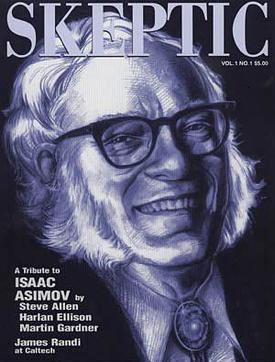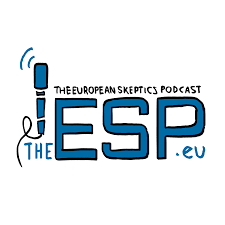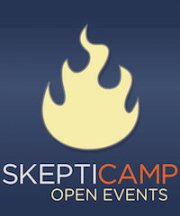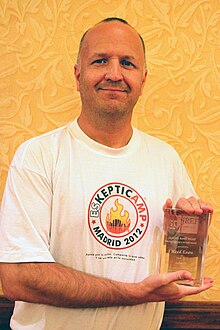
The Committee for Skeptical Inquiry (CSI), formerly known as the Committee for the Scientific Investigation of Claims of the Paranormal (CSICOP), is a program within the U.S. non-profit organization Center for Inquiry (CFI), which seeks to "promote scientific inquiry, critical investigation, and the use of reason in examining controversial and extraordinary claims." Paul Kurtz proposed the establishment of CSICOP in 1976 as an independent non-profit organization, to counter what he regarded as an uncritical acceptance of, and support for, paranormal claims by both the media and society in general. Its philosophical position is one of scientific skepticism. CSI's fellows have included notable scientists, Nobel laureates, philosophers, psychologists, educators, and authors. It is headquartered in Amherst, New York.
Skeptical Inquirer is a bimonthly American general-audience magazine published by the Committee for Skeptical Inquiry (CSI) with the subtitle: The Magazine for Science and Reason.
Scientific skepticism or rational skepticism, sometimes referred to as skeptical inquiry, is a position in which one questions the veracity of claims lacking empirical evidence. In practice, the term most commonly references the examination of claims and theories that appear to be beyond mainstream science, rather than the routine discussions and challenges among scientists. Scientific skepticism differs from philosophical skepticism, which questions humans' ability to claim any knowledge about the nature of the world and how they perceive it, and the similar but distinct methodological skepticism, which is a systematic process of being skeptical about the truth of one's beliefs.

Skeptic, colloquially known as Skeptic magazine, is a quarterly science education and science advocacy magazine published internationally by The Skeptics Society, a nonprofit organization devoted to promoting scientific skepticism and resisting the spread of pseudoscience, superstition, and irrational beliefs. First published in 1992, the magazine had a circulation of over 50,000 subscribers in 2015.

Skepticality is the official podcast of The Skeptics Society's Skeptic magazine. Beginning in May 2005, the podcast explores rational thought, skeptical ideas, and famous myths from around the world and throughout history. Each episode is an audio magazine featuring regular segments by contributors who are specialized in specific areas of critical thought followed by featured content which is usually in the form of an interview with a researcher, author, or individual who is helping promote skeptical thought and/or science in an effective way. It has featured interviews with James Randi, and scientists, such as authors and astronomers Phil Plait and Neil deGrasse Tyson, Greg Graffin from Bad Religion, Adam Savage from the MythBusters, songwriter Jill Sobule, author Ann Druyan and science communicator Bill Nye.

The Amazing Meeting (TAM), stylized as The Amaz!ng Meeting, was an annual conference that focused on science, skepticism, and critical thinking; it was held for twelve years. The conference started in 2003 and was sponsored by the James Randi Educational Foundation (JREF). Perennial speakers included Penn & Teller, Phil Plait, Michael Shermer and James "The Amazing" Randi. Speakers at the four-day conference were selected from a variety of disciplines including scientific educators, magicians, and community activists. Outside the plenary sessions the conference included workshops, additional panel discussions, music and magic performances and live taping of podcasts including The Skeptics' Guide to the Universe. The final Amazing Meeting was held in July 2015.

The Skeptics' Guide to the Universe (SGU) is an American weekly skeptical podcast hosted by Steven Novella, MD, along with a panel of contributors. The official podcast of the New England Skeptical Society, it was named to evoke The Hitchhiker's Guide to the Galaxy. The show features discussions of recent scientific developments in layman's terms, and interviews authors, people in the area of science, and other famous skeptics. The SGU podcast includes discussions of myths, conspiracy theories, pseudoscience, the paranormal, and other forms of superstition, from the point of view of scientific skepticism.

NZ Skeptics is a New Zealand incorporated society created in 1986, with the aim of promoting critical thinking. The main areas of interest to the NZ Skeptics are claims of psychic abilities, alternative medicine, creationism and other pseudoscientific claims. At its founding in 1986, it was known as the New Zealand Committee for the Scientific Investigation of Claims of the Paranormal (NZCSICOP). In 2007 the name was formally changed to NZ Skeptics Incorporated.

Daniel Loxton is a Canadian writer, illustrator, and skeptic. He that wrote or co-wrote several books including Tales of Prehistoric Life, a children's science trilogy, and Abominable Science!. As editor of Junior Skeptic, Loxton writes and illustrates most issues of Junior Skeptic, a children's science section in the Skeptics Society's Skeptic magazine.

Kylie Sturgess is a past President of the Atheist Foundation of Australia, an award-winning blogger, author and independent podcast host of The Token Skeptic Podcast. A Philosophy and Religious Education teacher with over ten years experience in education, Sturgess has lectured on teaching critical thinking, feminism, new media and anomalistic beliefs worldwide. She is a Member of the James Randi Educational Foundation (JREF) Education Advisory Panel and regularly writes editorial for numerous publications, and has spoken at The Amazing Meeting Las Vegas, Dragon*Con (US), QED Con (UK). She was a presenter and Master of Ceremonies for the 2010 Global Atheist Convention and returned to the role in 2012. Her most recent book The Scope of Skepticism was released in 2012. She is a presenter at Perth's community radio station RTRFM, and a winner at the 2018 CBAA Community Radio Awards in the category of Talks, with the show Talk the Talk In 2020 she was in the final eight in the Three-Minute Thesis (3MT) Asia-Pacific virtual showcase.

Desiree Schell is the host of the live Canadian call-in radio talk show and podcast "Science for the People". An advocate for scientific skepticism, Schell is a strong advocate of critical thinking and is strongly interested in the promotion of skepticism publicly. In her work as a labour organizer, Schell creates curricula and teaches courses on effective activism, drawing on the experience of other social movements.

Mark Edward is an American mentalist and author. He has written books on mentalism, séance theory and production, including Psychic Blues published in 2009, where he discusses working for the Psychic Friends Network. Wilson has appeared on television as both primary consultant and on-air performer in such diverse programming as ABC's "The Con", A & E's Biography: "Houdini, the Great Escape," NBC's "The Other Side" and "Psychic Secrets Revealed," The Sci-Fi Channel's "Mysteries, Magic and Miracles," The Discovery Channel's "Forces Beyond," and on two episodes of The Learning Channel's "Exploring the Unknown." His featured segment as a spirit medium on the pilot episode of Showtime's "Penn & Teller's Bullshit!" series entitled "Speaking with the Dead" helped secure an Emmy Award nomination for that episode in 2002. He is a fellow with the Committee for Skeptical Inquiry.

Karen Stollznow is an Australian-American author, linguist, public speaker, and podcaster. Her books include Missed Conceptions: How We Make Sense of Infertility, On the Offensive: Prejudice in Language Past and Present, The Language of Discrimination, God Bless America: Strange and Unusual Religious Beliefs and Practices in the United States, Haunting America, Language Myths, Mysteries and Magic, Hits and Mrs, and Would You Believe It?: Mysterious Tales From People You'd Least Expect. Stollznow also writes short fiction, including the title Fisher's Ghost and Other Stories, and she is a host on the podcast Monster Talk with Blake Smith. She has written for many popular publications, including The Conversation and Psychology Today. Stollznow has also appeared as an expert on many TV shows, including A Current Affair and the History Channel's History's Greatest Mysteries.

Susan Gerbic is an American studio photographer who became known as a scientific skepticism activist, mostly for exposing people claiming to be mediums. A columnist for Skeptical Inquirer, she is the co-founder of Monterey County Skeptics and a fellow of the Committee for Skeptical Inquiry.
David Paulides is a former police officer who is now a conspiracy theorist, investigator and writer known primarily for his self-published books dedicated to proving the reality of Bigfoot, and establishing the Missing 411 conspiracy theory. Missing 411 is a series of books and films, which document cases of people who have gone missing in national parks and elsewhere, and assert that these cases are unusual and mysterious, contrary to data analysis which suggests that they are not actually statistically mysterious or even unexpected.

QED: Question, Explore, Discover is an annual skeptical conference held in Manchester, England. QED is organised by North West Skeptical Events Ltd (NWSE), a volunteer-owned non-profit organisation originating from a collaboration between the Merseyside Skeptics Society and the Greater Manchester Skeptics Society.

CSICon or CSIConference is an annual skeptical conference typically held in the United States. CSICon is hosted by the Committee for Skeptical Inquiry (CSI), which is a program of the Center for Inquiry (CFI). CSI publishes the magazine Skeptical Inquirer.

The European Skeptics Podcast (TheESP) is a weekly podcast recorded in English and hosted by three skeptics from several different European countries: András Gábor Pintér from Hungary, Pontus Böckman from Sweden and Annika Harrison from Germany who joined the team in July 2020. The main goal of the podcast is to "support European level actions within the skeptical movement and build bridges among skeptics" all over the continent. The show is often jokingly referred to by other podcasters and people interviewed on the show as "the REAL ESP experience" referring to a namesake pseudoscientific concept.





















